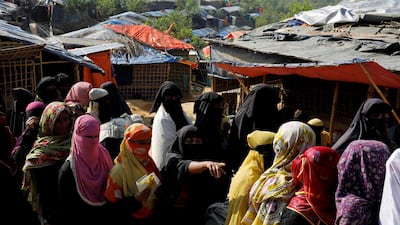A Bangladesh court on Monday upheld a government ban on marriage between its citizens and refugees from Myanmar's persecuted Rohingya minority, who have fled ethnic violence in the neighbouring country.
The high court in Dhaka dismissed a legal challenge from a man whose son married a Rohingya teenager in a Muslim ceremony in September despite laws forbidding such unions.
Marriages with Rohingya were banned in 2014 to try to prevent hundreds of thousands of refugees living in Bangladesh from seeking a back door to citizenship.
Babul Hossain, whose 26-year-old son ran away with his new wife after they married, questioned the legality of the ruling that threatens a seven-year jail term for any Bangladeshi who weds a Rohingya refugee.
But the court rejected his plea and ordered him to pay 100,000 taka (Dh4,400) in legal costs.
"The court rejected the petition and has upheld the administrative order, which bans marriage between Bangladeshi citizens and Rohingya people," deputy attorney general Motaher Hossain Saju said.
Mr Hossain's request that the court protect his son from arrest was also rejected, Mr Saju added.
About 655,000 Rohingya have escaped to Bangladesh since August after the Myanmar army began a campaign of rape and murder in Rakhine state.
They joined the more than 200,000 refugees already living in Bangladesh who had fled previous violence in Rakhine.
Aid groups have reported cases of Bangladeshis offering young women marriage as a way of escaping the overcrowded refugee camps along the south-eastern border with Myanmar.
Mr Hossain could not be contacted after the ruling but in a previous statement he defended his son's marriage to the 18-year-old Rohingya woman and denied it was driven by a quest for citizenship.
"If Bangladeshis can marry Christians and people of other religions, what's wrong in my son's marriage to a Rohingya?" he said.
"He married a Muslim who took shelter in Bangladesh."
__________
Read more:
Desperate, destitute, damaged: the plight of Myanmar's persecuted Rohingya Muslim refugees
Rohingya face uncertain future in Bangladesh
Rohingya insurgents launch rare attack on Myanmar military
__________

